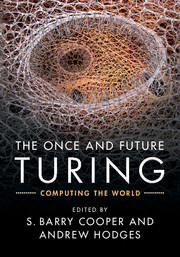Book contents
- Frontmatter
- Contents
- Contributors
- Preface
- Introduction
- Part One Inside Our Computable World, and the Mathematics of Universality
- Part Two The Computation of Processes, and Not Computing the Brain
- Part Three The Reverse Engineering Road to Computing Life
- Part Four Biology, Mind, and the Outer Reaches of Quantum Computation
- Part Five Oracles, Infinitary Computation, and the Physics of the Mind
- 13 Turing's ‘Oracle’: From Absolute to Relative Computability and Back
- 14 Turing Transcendent: Beyond the Event Horizon
- 15 On Attempting to Model the Mathematical Mind
- Afterword
- References
15 - On Attempting to Model the Mathematical Mind
from Part Five - Oracles, Infinitary Computation, and the Physics of the Mind
Published online by Cambridge University Press: 05 March 2016
- Frontmatter
- Contents
- Contributors
- Preface
- Introduction
- Part One Inside Our Computable World, and the Mathematics of Universality
- Part Two The Computation of Processes, and Not Computing the Brain
- Part Three The Reverse Engineering Road to Computing Life
- Part Four Biology, Mind, and the Outer Reaches of Quantum Computation
- Part Five Oracles, Infinitary Computation, and the Physics of the Mind
- 13 Turing's ‘Oracle’: From Absolute to Relative Computability and Back
- 14 Turing Transcendent: Beyond the Event Horizon
- 15 On Attempting to Model the Mathematical Mind
- Afterword
- References
Summary
Abstract
In his important 1939 paper, Alan Turing introduced novel notions such as ordinal logics and oracle machines. These could be interpreted as possible ingredients of an approach to model human mathematical understanding in a way that goes beyond the conventional ideas of formal systems of axioms and rules of procedure. A hope appears to have been that in this way one might circumvent the limitations to formal reasoning that are revealed by Gödel's incompleteness theorems. In line with such aims, an idea of a cautious oracle device is here introduced (differing, in intention, from related ideas put forward by others previously), which is supposed to give accurate answers to mathematical questions whenever it claims to have an answer, but which may sometimes confess to being unable to provide an answer and sometimes continues trying indefinitely without success. Despite such devices seeming to be somewhat closer to human mathematical capabilities than appears to be provided by a standard Turing machine, or Turing oracle machine, they are still limited by being subject to a Gödel-type diagonalization argument. Although leaving open the question of what actual physical processes might underlie human mathematical insight, these arguments appear to indicate a significant constraint on any such hypothetical process.
Turing's ordinal logics
In early September 1955, I attended a lecture given by Max Newman on the topic of ordinal logic. I found the lecture to be one of the most fascinating that I ever attended. Alan Turing had died only a little over a year earlier and this talk was dedicated to him, being essentially based on Turing's 1939 paper on this topic. Newman also started his lecture by providing, as Turing had done in his paper, an introduction to Church's λ -calculus. It has been said that the somewhat limited initial impact that Turing's 1939 paper had on the mathematical community at that time may have been partly due to his phrasing the paper in terms of the λ -calculus, which is hard to employ in an explicit way and makes the reading difficult. Nonetheless, one of the things that did strike me particularly about Newman's lecture was the extraordinary economy of concept exhibited by Church's calculus.
- Type
- Chapter
- Information
- The Once and Future TuringComputing the World, pp. 361 - 378Publisher: Cambridge University PressPrint publication year: 2016
References
- 1
- Cited by



